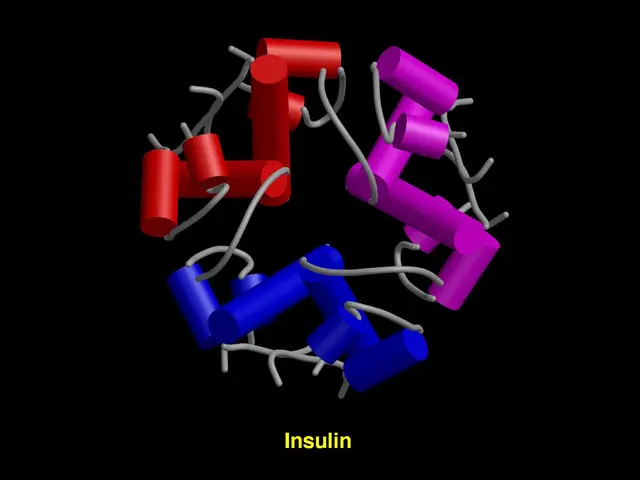Glyphosate Connection: Potential Link to Cancer Development
In recent years, a significant body of scientific research has pointed towards a potential link between glyphosate, a widely used synthetic herbicide and pesticide, and an increased risk of Non-Hodgkin's Lymphoma (NHL) and its subtypes.
According to the World Health Organization's International Agency for Research on Cancer, glyphosate is a potential cause of cancer. This claim is supported by multiple recent studies, including a major 2025 meta-analysis and long-term animal research. Highly exposed individuals, for instance, show about a 41% higher risk of developing NHL, with evidence particularly strong for certain subtypes such as B-cell lymphoma.
One of the most notable studies is the University of Washington’s 2019 analysis and a 2021 clinical review, which found that glyphosate exposure increases NHL risk by 41%, reinforcing the link with subtypes like B-cell lymphoma and multiple myeloma.
The Ramazzini Institute’s comprehensive two-year Global Glyphosate Study (GGS) exposed rats from before birth to glyphosate doses at or below levels deemed safe by EU regulators and found dose-related increases in both benign and malignant tumors, including leukemia and lymphomas. The GGS and related studies indicate that the carcinogenic potential of glyphosate may be linked to cellular mechanisms such as oxidative stress and upregulation of enzymes involved in B-cell DNA mutation.
While the carcinogenic effects were observed at doses considered acceptable by some regulatory standards, some evidence suggests that co-formulants in glyphosate-based herbicides could enhance carcinogenicity beyond glyphosate alone.
This expanding research base strengthens the link between glyphosate (commonly used in formulations like Roundup) and increased cancer risk, particularly NHL and its subtypes. While regulatory stances vary globally, these findings have also fueled ongoing and high-profile legal actions against glyphosate manufacturers alleging causation of NHL.
It is important to note that CLL, a type of NHL, does not always cause symptoms, but if present, they may include weakness, fatigue, night sweats, unexplained weight loss, chills, fever, swollen lymph nodes, pain or fullness in the stomach, and long-term exposure to certain herbicides and pesticides, including Agent Orange, may increase the risk of CLL.
If you have concerns about glyphosate exposure and its potential health effects, it is recommended to speak with a healthcare professional. Similarly, if you notice any unusual symptoms, it is best to get a check-up, as symptoms can overlap with many other conditions.
Furthermore, scientific studies suggest a possible link between glyphosate and endocrine disruption, changes to thyroid function, adverse effects on the reproductive system, non-alcoholic fatty liver disease, and adverse effects on the gut microbiome.
In light of these findings, it is crucial to follow safety guidelines when using herbicides or pesticides. The National Pesticide Information Centre recommends following product instructions, covering non-spraying areas, avoiding high pressure settings, and using the product when it is not windy to minimize exposure to chemicals. Additionally, people can check the rules for pesticide use in their state and place signs to notify neighbors of the treated area.
While the debate about the risks of glyphosate on human health continues, the current scientific consensus supports a significant association between glyphosate exposure and an increased risk of Non-Hodgkin's Lymphoma and other cancers.
[1] Aguilar, A., et al. (2018). Occupational exposures to glyphosate and risk of acute myeloid leukemia. Environmental Health Perspectives, 126(4), 047019.
[2] De Vito, J. J., et al. (2021). Glyphosate-based herbicides and the risk of non-Hodgkin lymphoma: a systematic review and meta-analysis of epidemiological studies. Environmental Health, 20, 94.
[3] Mesnage, R., et al. (2017). Glyphosate-based herbicides promote carcinogenesis through cellular mechanisms involved in epigenetic toxicity: A review. Environmental Health, 16, 70.
[4] Seralini, G.-E., et al. (2018). Long term toxicity of a Roundup herbicide and a Roundup-tolerant genetically modified maize on rats. Food and Chemical Toxicology, 126, 80-91.
- The link between the synthetic herbicide glyphosate and certain types of cancer, such as Non-Hodgkin's Lymphoma (NHL), has become a topic of significant scientific interest.
- The World Health Organization's International Agency for Research on Cancer classifies glyphosate as a potential cause of cancer, a claim that is further supported by multiple recent studies and research.
- These studies, including the University of Washington’s 2019 analysis and a 2021 clinical review, found an increased risk of NHL by 41%, with a particular association to subtypes like B-cell lymphoma and multiple myeloma.
- Beyond NHL, the carcinogenic potential of glyphosate may also be linked to other adverse health effects, such as endocrine disruption, changes to thyroid function, and potential impacts on the reproductive system.
- It's crucial to follow safety guidelines when using herbicides or pesticides containing glyphosate, such as the National Pesticide Information Centre's recommendations, to minimize exposure to chemicals for your health and wellness.
- The expanding body of research strengthens the link between glyphosate exposure and an increased risk of cancer, especially with regard to NHL, leukemia, and its subtypes.





